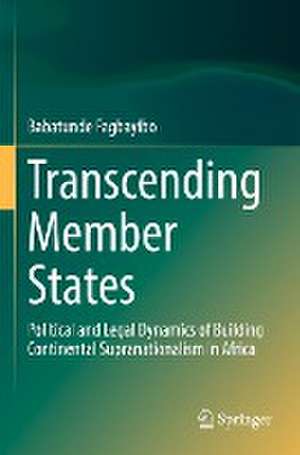Transcending Member States: Political and Legal Dynamics of Building Continental Supranationalism in Africa
Autor Babatunde Fagbayiboen Limba Engleză Paperback – 16 sep 2023
Africa is currently experiencing one of the most critical phases of its integrative development. Since 2015, there have been increasing efforts to develop policies and practices that grant the AU broader powers to coordinate and create binding rules regarding the regional integration process. In other words, these processes seek to endow the AU with supranational powers like those exercised by the European Union, which, despite its internal problems, remains the most successful experiment in supranationalism in the world.
This has included the decision to finance the AU through a 0.2% tax on eligible imports into member states; the decision to reduce the number of AU Commission portfolios from eight to six; the adoption and entry into force of the much touted Agreement establishing the African Continental Free Trade Area; the adoption of the Protocol to the Treaty Establishing the African Economic Community Relating to Free Movement of Persons, Right to Residence and Right of Establishment; and the adoption of the AU Agenda 2063 policy framework in 2015. How these processes will change the direction of regional integration in Africa, the book argues, largely depends on the existence of quality-driven institutions.
| Toate formatele și edițiile | Preț | Express |
|---|---|---|
| Paperback (1) | 635.15 lei 6-8 săpt. | |
| Springer International Publishing – 16 sep 2023 | 635.15 lei 6-8 săpt. | |
| Hardback (1) | 641.20 lei 6-8 săpt. | |
| Springer International Publishing – 15 sep 2022 | 641.20 lei 6-8 săpt. |
Preț: 635.15 lei
Preț vechi: 747.23 lei
-15% Nou
Puncte Express: 953
Preț estimativ în valută:
121.54€ • 132.43$ • 102.41£
121.54€ • 132.43$ • 102.41£
Carte tipărită la comandă
Livrare economică 23 aprilie-07 mai
Preluare comenzi: 021 569.72.76
Specificații
ISBN-13: 9783031124532
ISBN-10: 3031124537
Pagini: 167
Ilustrații: XVII, 167 p. 1 illus.
Dimensiuni: 155 x 235 mm
Greutate: 0.27 kg
Ediția:1st ed. 2022
Editura: Springer International Publishing
Colecția Springer
Locul publicării:Cham, Switzerland
ISBN-10: 3031124537
Pagini: 167
Ilustrații: XVII, 167 p. 1 illus.
Dimensiuni: 155 x 235 mm
Greutate: 0.27 kg
Ediția:1st ed. 2022
Editura: Springer International Publishing
Colecția Springer
Locul publicării:Cham, Switzerland
Cuprins
Introduction: Threading Together the “Africas”.- The Idea of Continental Supranationalism.- The African Union: Navigating the Intergovernmental/Supranational Terrain.-Understanding the Interplay of Law and Politics in the Matrix of Continental Supranationalism: The Elemental Prisms.- Transcending Member States: Pathways to Building Continental Supranationalism in Africa.- Conclusion: Summary and the Way Forward.
Notă biografică
Babatunde Fagbayibo is Professor in Professor in Law (Public, Constitutional and International Law) at the University of South Africa.
Textul de pe ultima copertă
This book explores innovative and context-driven political and legal policy measures designed to expand the powers of the African Union (AU) in order to meaningfully drive the continental integration process. In this regard, the book addresses issues of context, political will, and innovative and inclusive approaches as essential elements that must be considered.
Africa is currently experiencing one of the most critical phases of its integrative development. Since 2015, there have been increasing efforts to develop policies and practices that grant the AU broader powers to coordinate and create binding rules regarding the regional integration process. In other words, these processes seek to endow the AU with supranational powers like those exercised by the European Union, which, despite its internal problems, remains the most successful experiment in supranationalism in the world.
This has included the decision to finance the AU through a 0.2% tax on eligible imports intomember states; the decision to reduce the number of AU Commission portfolios from eight to six; the adoption and entry into force of the much touted Agreement establishing the African Continental Free Trade Area; the adoption of the Protocol to the Treaty Establishing the African Economic Community Relating to Free Movement of Persons, Right to Residence and Right of Establishment; and the adoption of the AU Agenda 2063 policy framework in 2015. How these processes will change the direction of regional integration in Africa, the book argues, largely depends on the existence of quality-driven institutions.
This has included the decision to finance the AU through a 0.2% tax on eligible imports intomember states; the decision to reduce the number of AU Commission portfolios from eight to six; the adoption and entry into force of the much touted Agreement establishing the African Continental Free Trade Area; the adoption of the Protocol to the Treaty Establishing the African Economic Community Relating to Free Movement of Persons, Right to Residence and Right of Establishment; and the adoption of the AU Agenda 2063 policy framework in 2015. How these processes will change the direction of regional integration in Africa, the book argues, largely depends on the existence of quality-driven institutions.
Caracteristici
Focuses on the interrelationship between law and politics in the process of continental integration in Africa Addresses three interrelated dynamics that will enhance the supranational powers of the African Union Introduces the three contextual elements that should be used to guide the supranational assessment of the African Union
